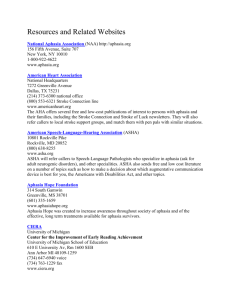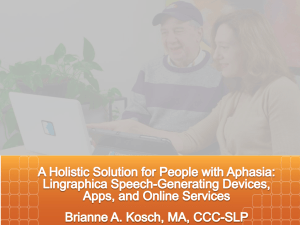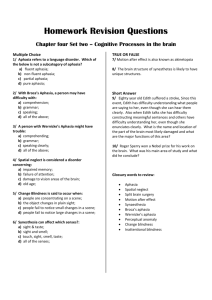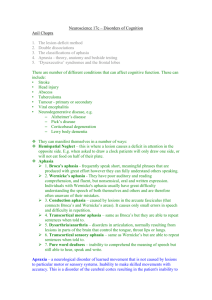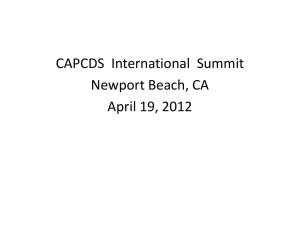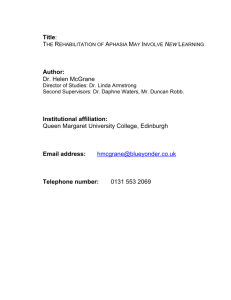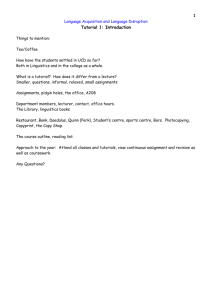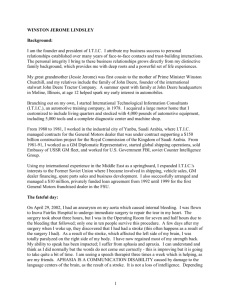the Aphasia document today!!
advertisement
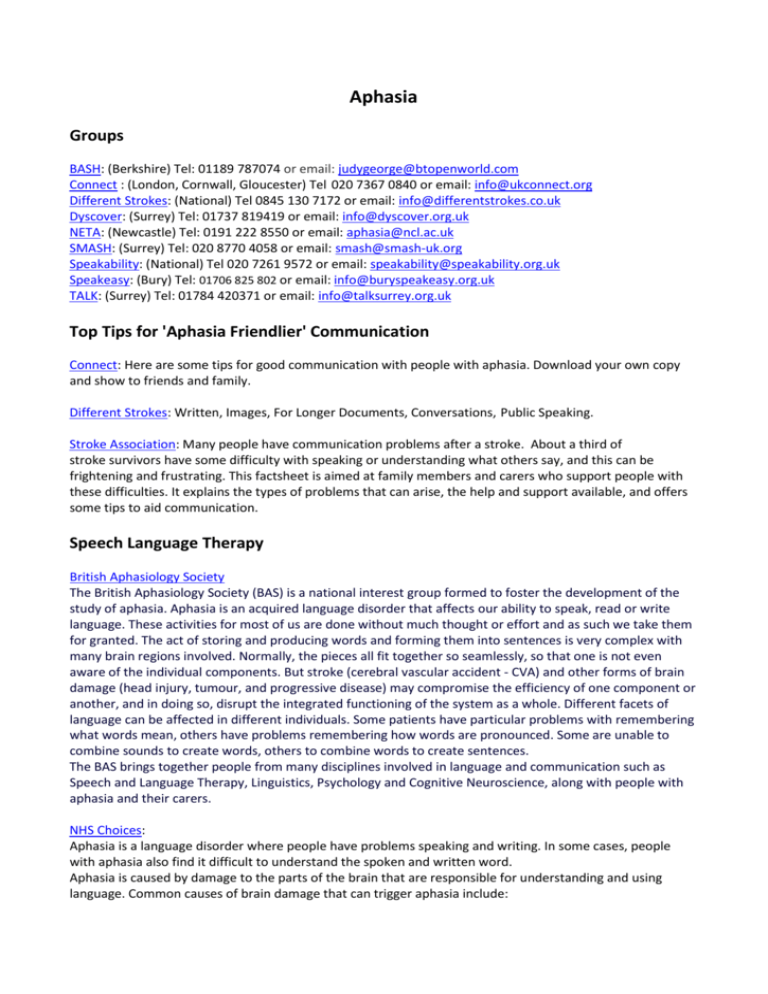
Aphasia Groups BASH: (Berkshire) Tel: 01189 787074 or email: judygeorge@btopenworld.com Connect : (London, Cornwall, Gloucester) Tel 020 7367 0840 or email: info@ukconnect.org Different Strokes: (National) Tel 0845 130 7172 or email: info@differentstrokes.co.uk Dyscover: (Surrey) Tel: 01737 819419 or email: info@dyscover.org.uk NETA: (Newcastle) Tel: 0191 222 8550 or email: aphasia@ncl.ac.uk SMASH: (Surrey) Tel: 020 8770 4058 or email: smash@smash-uk.org Speakability: (National) Tel 020 7261 9572 or email: speakability@speakability.org.uk Speakeasy: (Bury) Tel: 01706 825 802 or email: info@buryspeakeasy.org.uk TALK: (Surrey) Tel: 01784 420371 or email: info@talksurrey.org.uk Top Tips for 'Aphasia Friendlier' Communication Connect: Here are some tips for good communication with people with aphasia. Download your own copy and show to friends and family. Different Strokes: Written, Images, For Longer Documents, Conversations, Public Speaking. Stroke Association: Many people have communication problems after a stroke. About a third of stroke survivors have some difficulty with speaking or understanding what others say, and this can be frightening and frustrating. This factsheet is aimed at family members and carers who support people with these difficulties. It explains the types of problems that can arise, the help and support available, and offers some tips to aid communication. Speech Language Therapy British Aphasiology Society The British Aphasiology Society (BAS) is a national interest group formed to foster the development of the study of aphasia. Aphasia is an acquired language disorder that affects our ability to speak, read or write language. These activities for most of us are done without much thought or effort and as such we take them for granted. The act of storing and producing words and forming them into sentences is very complex with many brain regions involved. Normally, the pieces all fit together so seamlessly, so that one is not even aware of the individual components. But stroke (cerebral vascular accident - CVA) and other forms of brain damage (head injury, tumour, and progressive disease) may compromise the efficiency of one component or another, and in doing so, disrupt the integrated functioning of the system as a whole. Different facets of language can be affected in different individuals. Some patients have particular problems with remembering what words mean, others have problems remembering how words are pronounced. Some are unable to combine sounds to create words, others to combine words to create sentences. The BAS brings together people from many disciplines involved in language and communication such as Speech and Language Therapy, Linguistics, Psychology and Cognitive Neuroscience, along with people with aphasia and their carers. NHS Choices: Aphasia is a language disorder where people have problems speaking and writing. In some cases, people with aphasia also find it difficult to understand the spoken and written word. Aphasia is caused by damage to the parts of the brain that are responsible for understanding and using language. Common causes of brain damage that can trigger aphasia include: Stroke: which is thought to be the most common cause, as around 1 in 3 people experience some degree of aphasia after having a stroke Severe head injury Brain tumour Progressive neurological conditions (conditions that over time cause progressive brain and nervous system damage, such as Alzheimer’s disease) Royal College of Speech & Language Therapists: The Royal College of Speech and Language Therapists (RCSLT) was established on 6 January 1945 to promote the art and science of speech and language therapy – the care for individuals with communication, swallowing, eating and drinking difficulties. The RCSLT is the professional body for speech and language therapists in the UK; providing leadership and setting professional standards. We facilitate and promote research into the field of speech and language therapy, promote better education and training of speech and language therapists and provide information for our members and the public about speech and language therapy. Please use the navigation panel on the left to find out more about the RCSLT – the services we provide, the campaign work we do with governments and partner organisations and our activities with educators. Charities Aphasia Alliance: (National) Aphasia is a communication disability which occurs when the communication centres of the brain are damaged. It is usually caused by stroke, but can also be caused by a brain haemorrhage, brain tumour, or other neurological condition. The Aphasia Alliance is a coalition of key organisations from all over the UK that work in the field of Aphasia. We have united to raise awareness of Aphasia. The members of the Aphasia Alliance range from very small local charities, to large national organisations. Aphasia Now: (Gloucestershire) AphasiaNow is for people with aphasia 'AphasiaNow' was created by by people with aphasia, and is run for people with aphasia. The vision of Aphasia Now is to be an aphasia-friendly website and to provide a weekly support group in Gloucestershire. Chest, Heart & Stroke Scotland: (Scotland) CHSS launched a campaign to highlight the fact that a third of the estimated 12,500 people who have a stroke in the Scotland every year will be left with aphasia. Aphasia is a condition which affects the language skills of people after they have experienced brain damage. It can affect speech, understanding, reading and writing. Connect: (London, Cornwall, and Gloucestershire) Connect is a charity for people living with aphasia, a communication disability which usually occurs after stroke or brain injury. Dyscover: (Surrey) Dyscover is a charity providing long-term support and opportunities to people with aphasia and their families. Daily sessions are led by professional speech and language therapists and are designed to help people to adjust to living with aphasia. We help our members to develop strategies for communicating, maximise abilities and provide help and support for partners, carers and other family members. North East Trust for Aphasia: (NETA) (Newcastle) Welcome to the North East Trust for Aphasia (NETA) website. NETA is a charity which aims to support people with aphasia and their families in the North East. NETA does this by funding the NETA Aphasia Support Centre, which offers long terms support to people with aphasia, offering opportunities to take part in a variety of groups. Speakability: (National) More than a quarter of a million people in the UK have problems with speaking, reading, writing or understanding language. This communication disability is caused by damage to the language centre’s of the brain. It can come as the result of a stroke, head injury, brain tumor or other neurological illness. It should be noted that intellect is rarely affected. Speakeasy: (Bury) Speakeasy is a charity for people with aphasia; a communication difficulty following a stroke or head injury. At Speakeasy, speech and language therapists and volunteers provide long term help and support. Speakeasy offers different activities for people to practise their communication learn new skills and increase confidence. TALK: (Surrey) Aphasia (or dysphasia) is a difficulty with language. A person with Aphasia (probably following a stroke) may have difficulty in speaking, understanding, reading or writing. In short, communication can be a very daunting challenge. Most of us are instinctively shy when we meet someone with communication difficulties; and yet imagine being in their position. Frustrated because you can't get your point across, although your intellect is quite undamaged; you can't argue, you can't chat with friends as you used to. You know what you want to say, but you can't say it. The telephone can be a nightmare, as can shopping, dealing with money, reading train or bus timetables. Aphasia can affect relationships, work, and personality. The resulting loneliness and isolation affect not only the recovery’s quality of life, but that of family and carers. Sometimes called the 'hidden disability', loss of language is not officially recognized as a disability - despite a quarter of a million people in the UK suffering from dysphasia. The Tavistock Trust for Aphasia: (National) After his stroke in 1988, Robin was unable to speak - he could say "yes" and "no" but was not able to access language. It was a very frightening and frustrating experience. His road after stroke was a long one, but without doubt his aphasia, the silent disability, was the one that most affected his quality of life. His life was saved by prompt and highly skilled surgery. With the support from family and friends and with intensive speech therapy, he slowly but surely began to recover. In 1992, Robin founded the Tavistock Trust for Aphasia, the only grant making trust in the UK to focus solely on aphasia. Robin’s hope was that everyone who has aphasia would be able to receive the kind of help he had received. Resources are few today, but through funding innovative and inspirational projects and research we are seeing his dream come true. The Tavistock Trust for Aphasia is not a memorial to Robin, it is part of his living legacy. It is making a difference and I know he would be very proud of all that is being achieved. Technology: Browse Aloud: Bring your website alive with BrowseAloud’s high quality speech - now available for Mobiles, Tablets, PCs and Macs. BrowseAloud adds speech and reading support tools to online content to extend the reach of websites for the 20% of the population that requires reading support. This includes those with dyslexia, learning difficulties, mild visual impairments and those with English as a second language. Video Ivona: Text-to-speech (TTS) uses computer-generated synthetic speech to read out each word. It can also be used to access things like menu options on electronic equipment such as computers. It is commonly available in sat nav systems and railway station announcements. TTS is built into the Windows and Macintosh computer operating systems, many mobile phones, tablet computers and devices like the iPod touch. Third party TTS applications are available for many systems that do not have one built in. For most people text-to-speech can be useful, but for those who struggle to read the printed word, it can be an essential form of access. It has been used for many years to read electronic documents, websites and emails. Video and Video Kindle: If you use a Kindle reader to read electronic books and other documents, you might sometimes prefer to have the device read text aloud to you. The Kindle is a battery-powered portable device made by Amazon that can connect wirelessly to the Internet to download books and other printed documents. The Kindle has a text-to-speech feature that enables you to have the device read material to you through headphones or the built-in speakers. Natural Reader: NaturalReader is a text-to-speech software with natural sounding voices. This easy-to-use software can read to you any text such as Microsoft Word files, webpages, PDF files, and E-mails. NaturalReader can also convert any written text into audio files such as MP3 or WAV. NaturalReader has many other functions, such as audio editor and OCR. With audio editor, you can be your own sound editor by recording, merging and editing audio files. OCR function works with your scanner to convert printed characters into digital text and it is up to 99% accurate. This allows you to listen to your printed file or edit it in a word-processing program. Press Display: PressReader is a free application that enables you to download your favourite publications to your PC, Mac, tablet, mobile device or eReader allowing you to read them even when you’re offline. Powered by NewspaperDirect’s PressDisplay.com technology, PressReader provides access to over 2,200 full-content newspapers and magazines from 97 countries in 54 languages. With every article, advertisement, crossword puzzle and cartoon presented in its original context, PressReader offers many of the same rich user interface and intuitive interactive features PressDisplay.com users have come to love. And with the added convenience of being able to hold your favourite publication directly in your hands and read it from cover to cover just the way you would in-print, PressReader makes reading full-content digital replicas an absolute delight with features such as: Video Auto-delivery of your favourite publications Attention-grabbing SmartFlow stream (iOS & Android) Printing full pages or articles Sharing stories by email or on Facebook or Twitter Saving articles to Evernote or Instapaper Listening to articles using on-demand audio Copying & pasting entire articles into note taking applications Sharing your opinion by supporting or opposing a story Adjusting font size and type Automatically aligning with the beginning of an article using the option SmartZoom feature Cross title search Authorization of PressReader with a PressDisplay.com subscription Text Help: It is easier to understand a block of text by listening to it, particularly if you struggle with reading. Read&Write GOLD reads text aloud to you from any document on your computer. Text can be read using a male or female voice. You can select your preferred voice and set the pitch, speed and volume to suit your individual needs. Words are highlighted as they are spoken, which helps you to track where you are on the page and it is proven to raise comprehension levels by 20%. Video Write OnLine: Whether you're a budding author or you find writing really difficult, WriteOnline will help you to create great documents and achieve your full potential. You'll find it really easy to use - you'll be up and writing in no time! Create and edit documents anywhere just open your web browser and login - you can access WriteOnline from home, school, college, anywhere! You can even access WriteOnline when you're not connected to the Internet if you've logged in during the previous three days. Develop writing fluency using built-in support hear your work read back to you with almost human-sounding speech. Find the words you want quickly with Wordflow™ word prediction. Expand your vocabulary and structure your writing with Wordbar® word banks and writing frames. Video Software: Aphasia Software Finder: The information found on this website is given in good faith and on the basis of over 25 years experience of researching and using software for the treatment of aphasia. We always recommend that you consult with your speech therapist about using software. The main reason that software has a role to play in the treatment of aphasia is that no health service is ever likely to be able to afford to fund the full amount of therapy that research shows that people with aphasia may benefit from. We know that intensive therapy can improve people’s aphasia and may even lead to physical changes in the brain. However the key word here is intensive. Imagine trying to run a marathon after only a week’s training! The body can change but it takes a lot of work – body-building is another example. Some software also tries to help you relearn words or phrases you may have lost. A lot of therapy involves intensive practice on fairly straightforward exercises and research has shown that many people with aphasia can use a computer to do these independently at home. Other research has shown that it is important to match the software to the needs of the individual, hence the value of guidance from yo0ur therapist. There is no evidence to suggest that using aphasia treatment software independently could cause any harm. There is now a wide range of software available, and more coming onto the 0market. Propeller speech & language therapy software: Do you assist a person who has had a stroke or head injury? View our special section dedicated to assisting carers and others who provide help to relatives or friends. Our proven computer programs can provide unlimited therapy practice in your own home. Video Step by Step: Do you or someone you know have difficulty communicating due to aphasia? Do you struggle to find the words you want to say? Do you want more intensive therapy at home, on a self-help basis? StepByStep 4.5 is a new breakthrough approach, developed to provide structured computer therapy exercises for people to use on their own. This empowering therapy puts you in control, with clinician designed videos to help guide as therapy progresses. Video Research: Cambridge University: Centre for Speech, Language and the Brain: is part of the Department of Psychology at the University of Cambridge. Our interdisciplinary research covers a wide range of issues in the cognitive neuroscience of language, object processing, semantics, the ageing brain and cognition. We integrate behavioural experimental and neuroimaging studies on healthy people, together with similar research on brain-damaged patients. City University: City Aphasia Research Clinic: The City Aphasia Research Clinic offers speech and language therapy to people with aphasia and is collecting extensive research data, so that we can understand aphasia better and explore the effects of therapy. Manchester University Neuroscience and Aphasia Research Unit: The Neuroscience and Aphasia Research Unit (NARU), within the School of Psychological Sciences, is a highly innovative research unit whose work centres around 4 major themes. Topics in each theme are all investigated using an interdisciplinary approach, and applying widely convergent research methods and techniques. Studies range from basic neuroscience (fMRI, MR tractography, TMS) to neuropsychological and clinically-applied investigations of both normal and neurological populations, including neurodegenerative disorders, stroke, traumatic brain injury and herpes simplex encephalitis. Newcastle University: North East Aphasia Centre: The Newcastle University Aphasia Therapy Resources are based on extensive experience within the North East Aphasia Centre based at Newcastle University. They draw on research into aphasia and aphasia therapy combined with the expert knowledge of a large group of specialist speech and language therapists. We are excited to be able to share some of the learning about aphasia therapy with the wider world and make these high quality resources available to all. The therapy resources are designed work on particular areas of language processing but it is envisaged that they will be used in a context which recognises the person’s individual needs and to facilitate overall communication. Sheffield University: Cognitive Neuroscience of Speech and Language: Research in the Cognitive Neuroscience group involves studies of speech and language processing in healthy children and adults, and also in people with acquired brain lesions and developmental disorders. Methodologies include behavioural studies, structural and functional brain imaging, and transcranial magnetic stimulation. Wellcome Trust Centre for Neuroimaging at UCL: The Wellcome Trust Centre for Neuroimaging at UCL (incorporating the Leopold Muller Functional Imaging Laboratory and the Wellcome Department of Imaging Neuroscience) is an interdisciplinary centre for neuroimaging excellence. We bring together clinicians and scientists who study higher cognitive function using neuroimaging techniques. Our goal is to understand how thought and behaviour arise from brain activity, and how such processes break down in neurological and psychiatric disease. Our research groups study all aspects of higher cognitive function including vision, hearing, memory, language, reasoning, emotion, decision making and social interactions. Home to SPM, the world's most popular tool for analysing neuroimaging data, the Centre seeks to answer fundamental questions about how the brain works in order to improve human and animal health. We host and train over 100 clinicians, scientists and support staff, and interact with over 200 collaborators both at UCL and throughout the world. As well as conducting scientific research, we offer a wide range of educational and training opportunities to support the development of imaging neuroscience both nationally and internationally, and have an active public engagement agenda. Books The Stroke and Aphasia Handbook (new edition): An essential tool to support people with stroke and aphasia in asking questions, having discussions and conversations, and making choices and decisions. Easy-tounderstand information on all aspects of life following stroke - from the early days to picking up the threads months and even years after the event. Developed in direct response to the experiences and needs of people living with stroke and aphasia and validated by people who have first-hand experience of stroke and aphasia, as well as medical and social services experts. Beautifully designed with dividers, communication cards, straightforward text, signposts to further help and information, helpful illustrations, a glossary and a quick-look guide to making communication easier. Connect Press publications: Better Conversations, Caring and Coping, Having a stroke being a parent, Access to the Arts, How to volunteer - A guide for people with aphasia, Volunteering and Aphasia: A guide for organisations recruiting people with aphasia as volunteers, Stroke Talk. Beyond Aphasia: Therapies For Living With Communication Disability: This book focuses explicitly on therapeutic techniques developed from a social model approach to disability and learning to live with difference. It describes theories, activities and methods of implementation developed from the work of Connect with people with long term aphasia. Theoretical discussion runs alongside practical ideas for therapy and evaluation, case studies and commentaries from the authors regarding the method and means of implementation. Synthesises theory and practice in this new area of service delivery. Its non-impairment led focus of the therapies means that it has wide appeal to therapists, health service professionals and volunteers who work with people with chronic disabilities affecting lifestyle and communication. The Aphasia Therapy File: Different from a textbook or academic journal, the File represents a collection of explicit descriptions about therapy interventions written by practitioners themselves. The description of the rationale for the therapy, the intervention itself and evaluation of outcomes are of paramount importance. Each contributor guides the reader through the thinking that they engaged in as they decided what to do, often with considerable frankness about the difficulties involved. The File will be of equal value to experienced practitioners and students alike. Talking About Aphasia: Living with Loss of Language After Stroke: This book is about living with aphasia - a language impairment which can result from stroke. Drawing on indepth interviews with fifty aphasic people, it explores the experience of aphasia from the dramatic onset of stroke and loss of language to the gradual revelation of its long-term consequences. The story is told from the perspective of aphasic people themselves. They describe the impact of aphasia upon their employment, education, leisure activities, finances, personal relationships and identity. They describe their changing needs and how well these have been met by health, social care and other services. They talk about what aphasia means to them, the barriers encountered in everyday life and how they cope. The book offers a unique insight into the struggle of living with aphasia, combining startlingly unusual language with a clear interlinking text. Aphasia Inside Out: Reflections on Communication Disability: This innovative new book brings together a number of different perspectives on aphasia, a communication impairment that can follow stroke. Contributors include people with personal experience of aphasia, as well as therapists, counsellors, educationalists, linguists and researchers who address issues of living with aphasia in their work. Whatever their perspective, whether personal, theoretical or professional, contributors reflect on and explore aspects of living with aphasia that have little place in conventional academic discourse. Accordingly, the chapters cover a range of issues, for example aphasia and the Internet, time and poetry. The diverse contributions are drawn together by an introductory chapter and a linking commentary. Aphasia Inside Out suggests new ways of thinking about aphasia, offers insights into the nature of the disabling barriers faced, and explores some creative possibilities open to people who live with communication disability. It will be a valuable resource for any professional or layperson who encounters aphasia in the course of daily life. On Aphasia: Or Loss of Speech, and the Localisation of the Faculty of Articulate Language: The different parts of this essay have already appeared, at certain intervals, in the pages of the Journal of Mental Science and it is in deference to the opinion of those whose judgment I am bound to respect, that I now venture to publish them in a collected form. If I have failed to contribute anything towards bridging the chasm which separates matter from mind, my researches will, at all events, tend to shrew how little we really know about that wonderful piece of mechanism the human brain. The Man Who Lost His Language: Sir John Hale is one of the world’s foremost Renaissance historians whose book "The Civilization of Europe in the Renaissance" (1993) won the Royal Society of Literature's Heinemann award and the international silver pen. Soon after delivering the second draft of his text, Hale had a stroke that deprived him of the power of speech. His wife Shelia Hale, set out to find out what had happened and how John might be brought back to normal as far as possible. The book combines a detailed account of dysphasia and what he can tell us about language with a personal account of John and Shelia's own experiences. The Diving-Bell and the Butterfly: ‘Locked-in syndrome: paralysed from head to toe, the patient, his mind intact, is imprisoned inside his own body, unable to speak or move. In my case, blinking my left eyelid is my only means of communication.’ In December 1995, Jean-Dominique Bauby, editor-in-chief of French ‘Elle’ and the father of two young children, suffered a massive stroke and found himself paralysed and speechless, but entirely conscious, trapped by what doctors call ‘locked-in syndrome’. Using his only functioning muscle – his left eyelid – he began dictating this remarkable story, painstakingly spelling it out letter by letter. His book offers a haunting, harrowing look inside the cruel prison of locked-in syndrome, but it is also a triumph of the human spirit. The acclaimed 2007 film adaptation, directed by Julian Schnabel, won Best Director at Cannes and was nominated for the Palme d’Or. My Year Off: Rediscovering Life after a Stroke: 'When I was just forty-two I suffered a severe stroke. Paralysed on my left side and unable to walk, I was confined to hospital for three months, then spent about a year recovering, slowly getting myself back into the world. When I was seriously ill in hospital, I longed to read a book that would tell me that I might expect in convalescence and also give me something to think about. . .'Not only a riveting account of his sudden illness, but of love being put under a real test: a heartwarming triumph' Kazuo Ishiguro, Sunday Times Books of the Year 'With its lucid heartfelt prose, My Year Off gives voice to the millions of people who suffer strokes . . . More importantly, this book is a testament to the parallel trials and courage of the family members of stroke victims' New York Times Book Review 'Few of us can write in perfect health with the wit, skill, honesty and compassion that McCrum manages following a stroke' Professor Anthony Clare. Video UK Connect: 4 Videos Dyscover: Video NETA: Video Sarah Scott: Video 1 Video 2 Video 3 Video 4 Video 5 Video 6 Video 7 Star Trek DS9 O’Brien’s Aphasia: Video Aphasia Aware sidebyside: Video Training City Lit: Communication group for people with aphasia: Do you experience some difficulties expressing yourself following a stroke? In this group you can learn additional ways to help your communication. The activities will include social conversations and discussions with a chance to share your experiences as well as some structured work.
